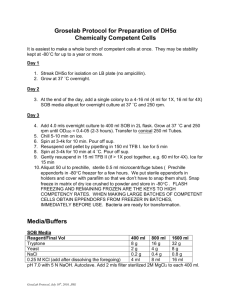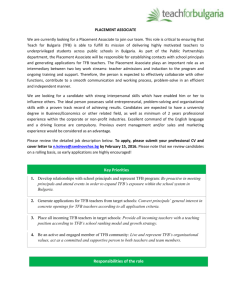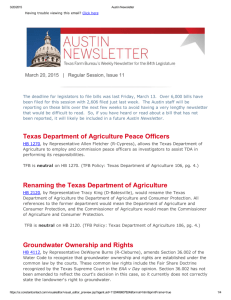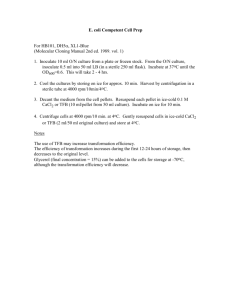12 month update and committee assessment of progress – Feb 2015
advertisement
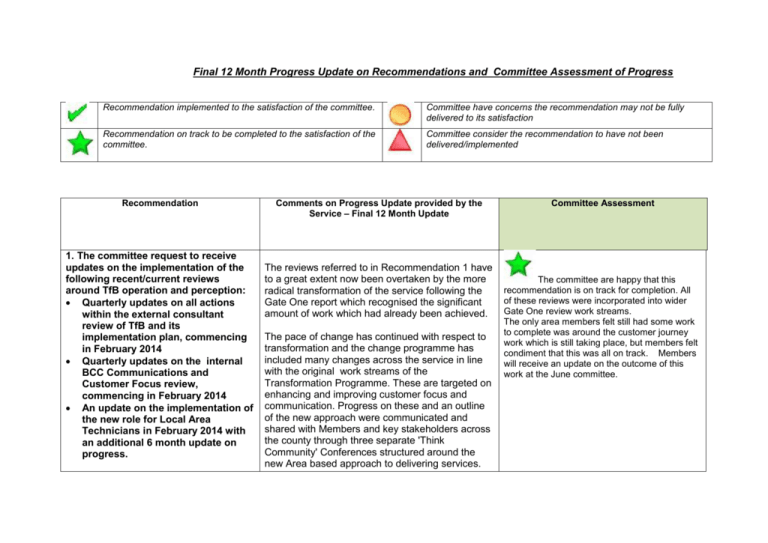
Final 12 Month Progress Update on Recommendations and Committee Assessment of Progress Recommendation implemented to the satisfaction of the committee. Committee have concerns the recommendation may not be fully delivered to its satisfaction Recommendation on track to be completed to the satisfaction of the committee. Committee consider the recommendation to have not been delivered/implemented Recommendation 1. The committee request to receive updates on the implementation of the following recent/current reviews around TfB operation and perception: Quarterly updates on all actions within the external consultant review of TfB and its implementation plan, commencing in February 2014 Quarterly updates on the internal BCC Communications and Customer Focus review, commencing in February 2014 An update on the implementation of the new role for Local Area Technicians in February 2014 with an additional 6 month update on progress. Comments on Progress Update provided by the Service – Final 12 Month Update The reviews referred to in Recommendation 1 have to a great extent now been overtaken by the more radical transformation of the service following the Gate One report which recognised the significant amount of work which had already been achieved. The pace of change has continued with respect to transformation and the change programme has included many changes across the service in line with the original work streams of the Transformation Programme. These are targeted on enhancing and improving customer focus and communication. Progress on these and an outline of the new approach were communicated and shared with Members and key stakeholders across the county through three separate 'Think Community' Conferences structured around the new Area based approach to delivering services. Committee Assessment The committee are happy that this recommendation is on track for completion. All of these reviews were incorporated into wider Gate One review work streams. The only area members felt still had some work to complete was around the customer journey work which is still taking place, but members felt condiment that this was all on track. Members will receive an update on the outcome of this work at the June committee. The following provides a general synopsis of progress across the work streams. More detailed information is given against each of the other 11 recommendations from the Inquiry Report where appropriate. Re-organisation - The re-organisation of TfB is substantially complete. The formal consultation period was completed at the end of October. Staff whose roles have been largely unaffected by the re-organisation have been slotted into place, and all ring fenced positions have been filled. Recruitment into vacancies is ongoing. Customer Journey - Both the new web based and mobile “Report It” applications are now live. The application improves the information the public can provide when reporting general highway defects, potholes, and issues with Public Rights of Way. Monitoring tools have been implemented and initial feedback from the customer remains positive with patronage starting to increase. A similar application for reporting street lighting faults is being developed, and is expected to be tested and delivered in February 2015 This work will substantially complete this work stream. Contract Review – All TfB services have been reviewed by reference to the Council’s own TEE transformation programme, to provide greater value to BCC. rd. The 3 Party commissioning process detailing works from other Place Service teams has been determined, and a plan is now in place and being followed. This will provide both clarity and surety to the delivery of work through TfB to Place Services. Work has progressed on improvements to Key Performance Indicators (see responses to Recommendation 3 and 4). A paper, resolving outstanding historical TfB commercial matters and recommending amendments to the current TfB contract, has now been agreed in principle by the Contract's Strategic Board. The review of the contract documents to take on board the recommended changes has commenced. It is expected that this will be completed through the issue of a number of contract variations. These will formalise the changes needed to resolve historic contractual matters and secure savings for the Council in accordance with 2015/16 MTP proposals. A report has been prepared and submitted to the Cabinet Member for Transportation seeking formal approval of the proposed contract changes. Other contractual changes are likely as other reviews complete. Information Flow – Tablet computers have been issued to the external LATs, and safety inspectors (13 in total). These devices remotely connect to the TfB asset and workflow system, allowing jobs to be allocated, raised, and closed while out on the network. The adoption of this approach will improve asset information and enhance responsiveness to defects and asset deterioration. Linked to the ‘Report It’ tool, this will improve the customer journey and experience of the TfB service. It also enables greater promotion of area based working. Culture Change - A number of cultural change initiatives have been undertaken across the TfB service. Gate One has conducted 1-2-1 sessions with each member of the Strategic Board during November. Feedback on these sessions is planned for January 2015. An over-arching cultural change model has been developed. This was initially designed to provide structure and context to Area based working, however it is being used for each service stream, placing the customer at the centre of the service. Further workshops are planned for early January 2015. The level of staff engagement has increased. Newsletters, initially focused on updating transformation progress, are now being issued every 2-3 weeks. Two TfB staff conferences have been held at High Wycombe and Aylesbury. These have been timed to coincide with the completion of the re-organisation, and designed to provide the teams detail on the direction the service going forward into 2015. The next conferences will be planned for March/April and are expected to be held every 6 months thereafter. This will now form part of service business as usual. VMF/Efficiency – The updated Highways Inspection Policy went live at the beginning of November 2014. Further training has been undertaken, and the benefits from the new approach are currently being captured and evaluated. Work has continued on developing and improving benchmarking processes. Efficiencies generated from the transformation process are being incorporated into the regular annual business planning cycle. (See also responses to Recommendations 9 and 10.) Policy & Strategy – TfB has reviewed the council’s over-arching corporate objectives of BCC. These objectives are being used to align the TfB services as part of the 2015/16 annual business plan development process which is currently ongoing. Over-arching policy reviews have commenced jointly with TfB and BCC officers. Draft policies are now expected to be ready for wider consideration in March 2015. The Governance structure for the TfB contract has been reviewed and was resubmitted to the Contract's Strategic Board in December for acceptance and implementation. 2. We recommend that the service ensure effective long-term planning (a 4 year plan which fits with the Council’s Medium term plan and budget proposals) to guide the annual The initial draft four year plan was presented to the Strategic Board in March 2014. The concepts of this plan have been adopted for The committee are happy that this is on track, members would just like to see the 4 year plan to satisfy themselves that it has been fully planning activity, with particular emphasis on efficiencies, value for money and longer term development of the transport network. The Environment, Transport and Locality Services Select Committee should receive a written update on any forthcoming long-term plans. 3.We recommend that all future KPIs evolve to place greater emphasis on long-term outcomes and improvements and that future setting/amending of KPIs be subject to wider Member involvement to inform the decision making process of the Strategic Management Board. The Cabinet Member should put forward options for this by February 2014 for the Environment, Transport and Locality Services Committee to comment on and agree. MTP 2015/16 Business Planning. completed. A new set of Key Performance Indicators (KPI’s) has been drafted to align with the Council’s corporate objectives. This has currently reduced the existing 41 contract KPI’s to 26 (19 contract and 7 alliance performance indicators), however this is likely to increase as Area based KPI’s are currently being developed and will need to be incorporated. The measurement methodology for each KPI is currently being finalised. The committee were happy that this was on track. Committee members had been involved in the development of the new KPIs. The only area they felt they needed more information on before signing this off as complete was on the new area based KPIs. Members wanted to have sight of these to comment on before fully signing this off. The indicators were shared at the Contract's Strategic Board in December and a workshop is being arranged with a view to the proposal being available at the January Strategic Board. The Current Key Performance Indicators (KPIs) have been used for the 2014/15 contract year to ensure consistency in delivery standards are maintained and ensure the appropriate control / challenges of the contract. 4.We recommend that KPI figures and values need to be properly audited on an annual basis, for example through internal audit or It is accepted that there will be joint audits by BCC & TfB on an annual basis to ensure appropriate challenge & check the KPI figures and results. The committee were reassured that new robust check and challenge processes are in the client team, in order to ensure that the decision making around payments and extensions is robust. A written report of the findings should go to the Strategic Management Board and also monitored by this select committee. The 13/14 KPI’s and close out of the year is still ongoing as the KPI’s and other elements are the subject to robust challenge and review prior to sign off, albeit significant progress has been made and only a small number of clarifications are outstanding. place to monitor KPIs now the client team has been strengthened. It is highlighted as on track as these improvements are early days and members felt the client side should not become complacent. Enhanced client resources are allowing a robust and detailed check and challenge to the achievement of performance targets. 5. We recommend that the Cabinet Member for Planning and Transport retains a Member-led system for road maintenance but: reviews the definition of Member-led currently used in the context of prioritising road maintenance to allow for greater flexibility in the approach and, examines the proportion of budget allocated between local member priorities, and a countywide strategic management approach. We request that the Cabinet Member commission a report on this topic, referencing national practice, and further options for road maintenance prioritising. Following feedback from Members and key stakeholders and evaluation of industry best practice the updated Highways Inspection Policy and consequential approach to asset data collection went live at the beginning of November 2014. Recent DfT guidance on future funding arrangements has identified the need to adopt a sustainable formalised whole asset management approach to the maintenance of highways assets. This, when married with collaborative working practices alongside other factors, allows the potential for unlocking maximum funding allocation. It is important therefore to ensure that the adopted Member led approach to road maintenance and management provides business intelligence to ensure a balanced and appropriate approach to investment is adopted. This needs to additionally balance against county objectives and development and investment priorities. There has been changes to the approach to have a better balance between member input and a strategic approach. Funding has been better aligned to ensure a sustainable asset management approach, informed by members. Members were very positive and complementary about the new ways of working and delivery. With a greater focus on longer term planning for maintenance works. It is acknowledged that Members provide a powerful insight into problems and the most appropriate solutions and that it is important to capture and harness this into an appropriate and effective approach to highway investment. The Cabinet Member will continue to review the effectiveness of the Council’s investment in strategic road maintenance, including the memberled programme, on a regular basis, and will discuss any proposals for change with the Select Committee as appropriate. 6. We recommend that at least two BCC elected Members are reappointed to the Strategic Management Board (or an alternative Member involvement option) in order to strengthen democratic representation, as recommended by the 2011 TfB scrutiny review. This action has been fully completed and captured in a Governance Paper presented and formalised at the contracts December Strategic Board Meeting 7. We recommend that the Strategic Client function should be sufficiently resourced to ensure the necessary client capacity and inhouse skills are in place so that the client can effectively manage the contract and provide robust check and challenge of delivery. The new organisational structure for the Client continues to be progressed. Interim arrangements to strengthen the client have been put in place pending “Future Shape” restructuring. Since the last update 2 more staff have been recruited to the Client side in the roles of Head of Highways and an additional Quality Inspector. The Client structure is now: The committee were happy that the client has been sufficiently resourced. They agreed the on track for completion status as the vacancies are currently filled with interim officers whilst recruitment takes place. The committee will receive an update in June to confirm that all posts are permanently filled following the restructure. Director of Transport Services (Interim) – Mike Freestone – dealing with overall contract relations and improvements Head of Highways (Interim) – Demos Kettenis – leading Client Team Operations Manager – Gareth Llewelyn (Interim) – dealing with operational delivery matters and focus on improving outputs at depots and through supply chain Quality Manager – Paul Turney (Permanent) – dealing with contractual and operational processes and improvements Compliance Manager – Raj Rajkumar (Interim) – dealing with contract administration matters, e.g. reviewing monthly payment applications Works Quality Inspector – Chris Thomas (Interim) – dealing with frontline service delivery and site quality output reviews Works Quality Inspector - Tim Fowler (Interim) dealing with frontline service delivery and site quality output reviews. This will continue to develop and permanent appointments made as part of the Future Shape structure. Recommendation NOT AGREED by Cabinet. 8. We recommend that the TfB report for the Strategic Management Board on the approval of the yearly contract extensions be circulated to the Environment, Transport and Locality Service Select Committee in order to inform the decision The issue of contract extensions and how they are managed form part of the Transformation Programme. In January 2014 Cabinet did not agree this recommendation. As part of the Transformation Programme Contract Review work stream the links between making process of the Strategic Management Board on the approval of contract extensions. performance and reward are being examined with particular focus on the extension concerns. This is particularly relevant to the agreement of KPIs to ensure that the indicators and measures drive and deliver the required outcomes and objective achievement. The proposed amendments to the Contract (see response to Recommendation 1 above) will address current anomalies in this area of the Contract. No further action is envisaged 9. We recommend that a schedule of areas for financial benchmarking against other Local Authorities be agreed between TfB and the Strategic Client. This should be reviewed annually by the Strategic Management Board to provide clarity over benchmarking activity to ensure contract compliance and value for money. Ringway Jacobs, with the BCC Client Team, are developing benchmarking systems and proposals which need to develop and broaden in scope. Currently the main focus is around comparison with other RJ operations. Cross Contract benchmarking papers have been developed, as commercial in confidence, and consideration is being given to how this work can be expanded. However, external benchmarking may not be beneficial or achievable due to the commercial sensitivity of information and accessibility of such data in the open market. It also needs to be appreciated that there are limitations to the exercise in drawing conclusions with many variables influencing the outturn costs and outputs achieved from contract to contract. The benchmarking document however provides a useful indicator of areas for exploration for potential The committee were happy that benchmarking was now taking place within other contracts with RJ and that option to expand benchmarking further are being explored. operational improvement and future efficiency and will continue to be improved. 10. We recommend that an external value for money review be undertaken (over the first half of 2014) to ensure and satisfy the client (BCC) that it is getting best value for money from the contract for elected Members and the residents of Buckinghamshire and that the committee receive a briefing on the findings of this review. A formal external Value for Money review has not yet been undertaken although as reported previously an externally led forensic audit of the payment process has been completed. This has not shown though any major areas of concern. Notwithstanding this, an action plan on issues and areas for improvement has been developed and is currently being delivered. In addition, the cross contract benchmarking exercise will help demonstrate to BCC the extent to which it is receiving value for money by comparison to other Ringway Jacobs contracts. As part of the MTP process consideration is being given to an expanded programme of Capital Maintenance Schemes. If this goes ahead there will be an opportunity for the Council and RJ to undertake more extensive market testing of this area of work in 2015/16. The results of this exercise should provide a useful source of data for assessing value for money from different contract approaches. Value for Money is important and is a significant part of work currently being developed with RJ as part of all aspects of the Transformation Programme. The committee will be holding a closed workshop in march with the Cabinet Member to discuss confidential papers ( Value for money review report) . The committee will come to its final conclusion when it has considered these papers and whether the review and findings go far enough, or whether an independent more detailed review is still required. 11. We recommend that the contractual obligation for a year -on -year 3% efficiency saving should be reviewed to allow for greater opportunity for cumulative and sustainable efficiency savings over a number of years. Alternative options should be drawn up by the Cabinet Member by the end of the 2013/14 financial year. The 3% contractual efficiency savings is currently applied. This is contained within the annual Business Plan approval process and is regularly monitored throughout the year. In addition this is supported by Value Plus (a process that identifies and records additional efficiency savings). Through this process significant improvements have been achieved over the life of the contract, in both cashable and non-cashable savings. Proposals have been developed for changes to the approach to the 3% efficiency saving to allow for greater opportunity for cumulative and sustainable efficiency savings over a number of years. BCC officers are currently evaluating the potential changes and options to the contract. 12: We recommend that all learning points from the TfB arrangement to date are used to inform future operation of the Council as it moves to become a commissioning/contracting organisation, in particular: 1) securing providers who are able to work in a democratic environment, 2) securing providers who can set out how they will meet strategic longer-term outcomes sought by the client, and 3) the need for a high-level contract management prepared to use contract clauses to meet Gate One have highlighted issues on how the business is structured and operated. The learning achieved from this process will be fed into and assist the authorities “Future Shape” programme. The Strategic Board and other Transformation meetings are attended variously be senior Members and also by senior Officers who are intrinsically linked with the counties corporate programmes, particularly Future Shape and ensure alignment both into the TfB review and vice versa. As above for value for money. Contract variations will be discussed in the confidential closed working group before the committee come to their final conclusion as to progress on this – so far it has not been evidenced that this change has happened. requirements.
